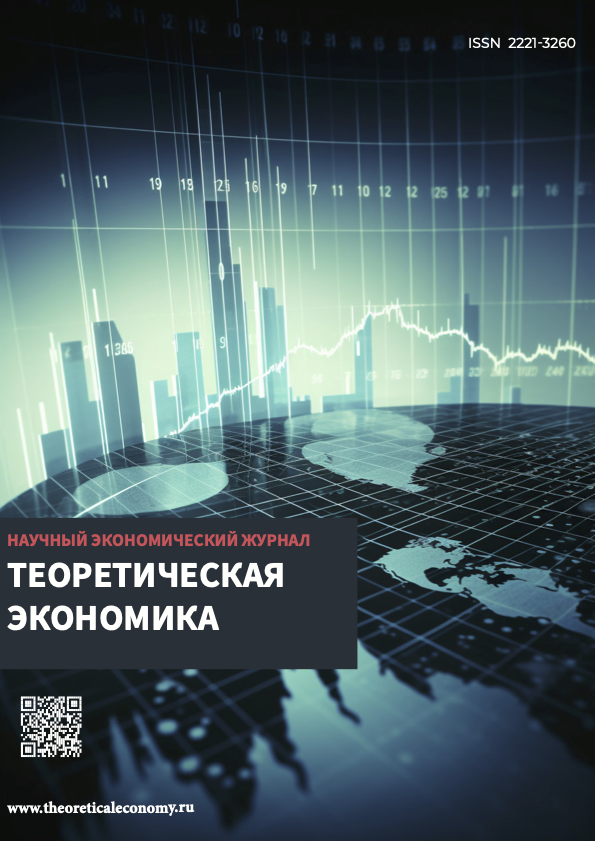Moskva, Moscow, Russian Federation
In the context of ongoing political and economic changes, it becomes necessary to regularly monitor the socio-economic situation in various countries. Any crises and upheavals have a strong impact on the living standards of the population. One such indicator is the average wage. The objectives of this study are: grouping statistical information by geographical sectors and determining the influence of individual factors on average wages, primarily the fact of urbanization. The study showed little fluctuation in average hourly wages across regions of France, with the exception of the Île-de-France region, in which the city of Paris is located. In this region, the average salary exceeds the national average by about 25%. This is due to the high average hourly wages in some districts of Paris, where the country's main political authorities are located. One of the results of the work carried out is the lack of official statistics on the data of the "black" labor market that exists in the overseas territories of the country, as well as the lack of data on the average length of the working week in various regions of France. In our opinion, it would be more reliable to take into account the average monthly or average weekly, rather than average hourly wages. The work reveals a certain impact of urbanization on the level of average hourly wages in the regions of the country.
person, France, Paris, statistics, standard of living of the population, average wage, social inequality, geographical regions of France, political power.
1. Bobkov V.N. Metodologicheskiy podhod Vserossiyskogo centra urovnya zhizni k izucheniyu i ocenke kachestva i urovnya zhizni naseleniya // Vestnik VGU. Seriya: Ekonomika i upravlenie. 2009. №2. – s.26-36.
2. Monitoring dohodov i urovnya zhizni naseleniya Rossii – 2021 god : [monografiya]. Vyp. 5 (201) / V. N. Bobkov [i dr.] ; otv. red. V. N. Bobkov, A. A. Gulyugina. – M. : FNISC RAN, 2022. – 114 s.
3. Nagimova A. M. Sociologicheskiy analiz kachestva zhizni naseleniya: regional'nyy aspekt. – Kazan': kazanskiy gos. un-t, 2010. – 306 s.
4. Nekrasova D.A. Ekonomika Francii: sostoyanie, tendencii i perspektivy razvitiya // Materialy VI Mezhdunarodnoy studencheskoy nauchnoy konferencii «Studencheskiy nauchnyy forum». URL: https://scienceforum.ru/2014/article/2014007047 (data obrascheniya: 03.12.2022).
5. Ovcharova L.N., Krasil'nikova M.D., Pishnyak A.I. Monitoring social'no-ekonomicheskogo polozheniya i social'nogo samochuvstviya naseleniya: tri kvartala 2021 goda/ pod red. L.N. Ovcharovoy. – M.: NIU VShE, 2021. – 36 s.
6. Sushko A. A. Social'no-ekonomicheskie faktory, vliyayuschie na uroven' zhizni naseleniya Rossii // Nauchno-metodicheskiy elektronnyy zhurnal «Koncept». – 2017. – T. 4. – S. 387–392. – URL: http://e-koncept.ru/2017/770364.htm (Data obrascheniya: 18.12.2022).
7. Uroven' zhizni i social'naya real'nost': monitoring peremen: monografiya / A.A. Shabunova, M.V. Morev, A.I. Rossoshanskiy, G.V. Belehova. – Vologda : ISERT RAN, 2015. – 122 s. (Problemy effektivnosti gosudarstvennogo upravleniya).
8. Lastochkina M.A. Faktory udovletvorennosti zhizn'yu: ocenka i empiricheskiy analiz. - Voprosy prognozirovaniya. 2012. № 5. – s.132-141.
9. Borodkin, F.M., Ayvazyan S.A. Social'nye indikatory / F.M. Borodkin, S.A Ayvazyan - M.: YuNITI-DANA, 2006. - 607 s.
10. Spiridonov S.P. Indikatory kachestva zhizni i metodologii ih formirovaniya // Voprosy sovremennoy nauki i praktiki. Universitet im. V.I. Vernadskogo. № 10 - 12 (31). - 2010. S. 208 - 223.
11. Rizvanova M.A. Sovremennye metody analiza i prognozirovaniya demograficheskih processov // Teoriya evolyucii social'no-ekonomicheskih sistem / pod red. akad. A.I. Tatarkina, akad. V.I. Maevskogo; RAN, UrO, In-t ekonomiki. - M.: ZAO «Izdatel'stvo «Ekonomika», 2008. S. 528-540.
12. David B. Resnik. International standards for research integrity: an idea whose time has come? // Account Res. 2009 Jul; 16(4): 218–228. DOIhttps://doi.org/10.1080/08989620903065350. URL: https://www.ncbi.nlm.nih.gov/pmc/articles/PMC3965194/ (Data obrascheniya: 05.12.2022).
13. Ikpidi Badji. Hippolyte d’Ablis. Intergenerational Inequalities in Standards of Living in France // ResearchGate. January 2017. URL: https://www.researchgate.net/publication/318088557_Intergenerational_Inequalities_in_Standards_of_Living_in_France (Data obrascheniya: 04.12.2022).
14. Nada Hazuchova. Jana Stavkova. A Comparison of Living Standards Indicators // European Journal of Business Science and Technology. November 2017. DOIhttps://doi.org/10.11118/ejobsat.v3i1.99. License: CC BY-SA. URL: https://www.researchgate.net/publication/322980513_A_Comparison_of_Living_Standards_Indicators (Data obrascheniya: 05.12.2022).
15. Wawrzyniak Dorota. Standard Of Living In The European Union // ResearchGate. April 2016. DOI:https://doi.org/10.1515/cer-2016-0008. License: CC BY-NC-ND 4.0. URL: https://www.researchgate.net/publication/301537632_Standard_Of_Living_In_The_European_Union (Data obrascheniya: 04.12.2022).
 This work is licensed under Creative Commons Attribution-NonCommercial-NoDerivatives 4.0 International
This work is licensed under Creative Commons Attribution-NonCommercial-NoDerivatives 4.0 International












